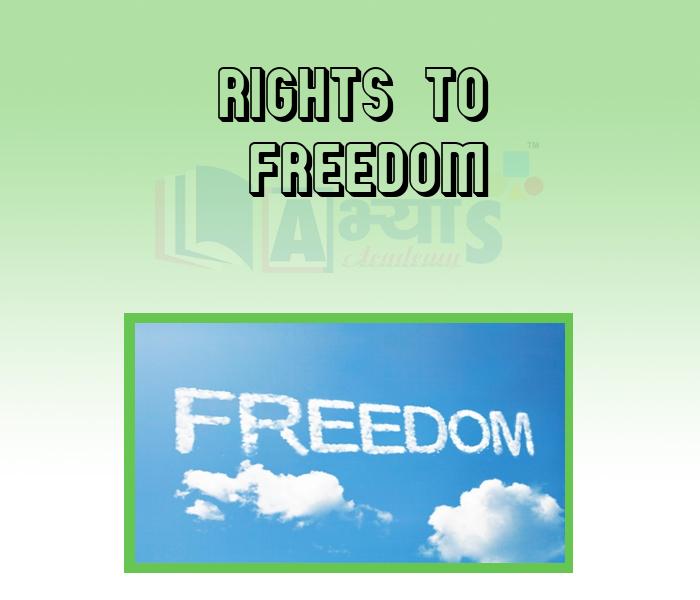Rights to Freedom













Rights to Freedom
Right to Freedom: Freedom means absence of constraint (restrictions). In practical life, it means absence of interference in our affairs by others—be it other individuals or the government. Under the Indian Constitution, all citizens have the right to
One cannot exercise his freedom in such a manner that violates others’ Right to Freedom. A person is free to do everything which injures or harms no one else. Freedom is not unlimited license to do what one wants. The government can impose certain reasonable restrictions on our freedom in the larger interests of the society.
Freedom of Speech and Expression: It is one of the essential features of any democracy. Even if a hundred people think in one way, you should have the freedom to think differently and express your views as you wish. You may express your views through pamphlets, magazines, newspapers, paintings, poetry or songs. However, you cannot use this freedom to stimulate violence against others and excite people to rebel against government. Neither can we use it to defame others by saying false and mean things that cause damage to a person’s reputation.
Assembly in a Peaceful Manner/Form Associations: Citizens have the freedom to hold meetings, processions, rallies and demonstrations on any issue. But such meetings should be peaceful and people participating in these should not carry weapons. Citizens also can form associations to promote their interests.
Freedom to Travel/Choice of Occupations: The citizen have the freedom to travel to any part of the country and are free to reside or settle in any part of the territory of India. This right allows lakhs of people to migrate from villages to towns and from poorer regions of the country to prosperous regions and big cities. The same freedom extends to choice of occupations. No one can force you to do or not do a certain job (especially women). Even people from deprived caste cannot be forced to keep their traditional occupations.
Personal Liberty: The Constitution says that no person can be deprived of his life or personal liberty except according to procedure established by law. It means that no person can be killed unless the court has ordered a death sentence. It also means that a government or police officer cannot arrest or detain any citizen unless he has proper legal justification. Even when police arrests someone, they have to follow some procedures like
Students / Parents Reviews [10]
My experience was very good with Abhyas academy. I am studying here from 6th class and I am satisfied by its results in my life. I improved a lot here ahead of school syllabus.

Ayan Ghosh
8thMy experience with Abhyas is very good. I have learnt many things here like vedic maths and reasoning also. Teachers here first take our doubts and then there are assignments to verify our weak points.

Shivam Rana
7thIt was good as the experience because as we had come here we had been improved in a such envirnment created here.Extra is taught which is beneficial for future.

Eshan Arora
8thOne of the best institutes to develope a child interest in studies.Provides SST and English knowledge also unlike other institutes. Teachers are co operative and friendly online tests andPPT develope practical knowledge also.

Aman Kumar Shrivastava
10thMy experience with Abhyas academy is very good. I did not think that my every subject coming here will be so strong. The main thing is that the online tests had made me learn here more things.

Hiya Gupta
8thAbout Abhyas metholodology the teachers are very nice and hardworking toward students.The Centre Head Mrs Anu Sethi is also a brilliant teacher.Abhyas has taught me how to overcome problems and has always taken my doubts and suppoeted me.

Shreya Shrivastava
8thI have spent a wonderful time in Abhyas academy. It has made my reasoning more apt, English more stronger and Maths an interesting subject for me. It has given me a habbit of self studying

Yatharthi Sharma
10thBeing a parent, I saw my daughter improvement in her studies by seeing a good result in all day to day compititive exam TMO, NSO, IEO etc and as well as studies. I have got a fruitful result from my daughter.

Prisha Gupta
8thA marvelous experience with Abhyas. I am glad to share that my ward has achieved more than enough at the Ambala ABHYAS centre. Years have passed on and more and more he has gained. May the centre flourish and develop day by day by the grace of God.

Archit Segal
7thAbhyas Methodology is very good. It is based on according to student and each child manages accordingly to its properly. Methodology has improved the abilities of students to shine them in future.
